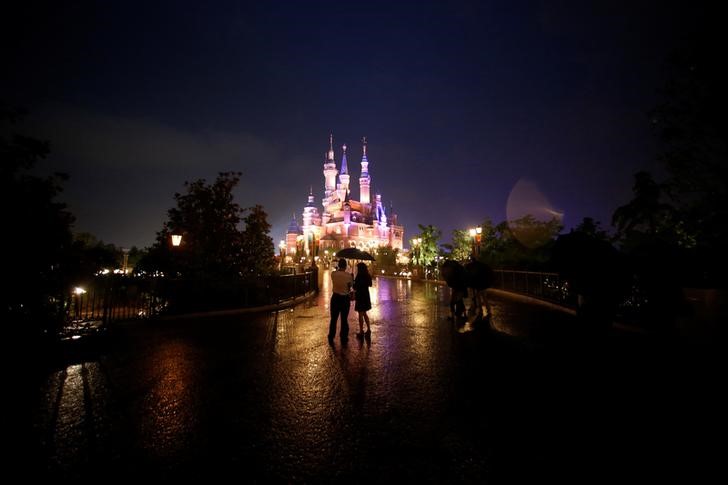By Adam Jourdan
SHANGHAI (Reuters) – Walt Disney Co has opened the gates to its first theme park in China, prompting a rush from thousands of gathered Mickey Mouse enthusiasts to be the first to storm Treasure Cove, ride the Roaring Rapids or visit Disney’s tallest castle.
Disney’s largest overseas investment at $5.5 billion, the park is a bet on China’s middle class and booming domestic tourism. The U.S. firm hopes it will offset an otherwise lacklustre international theme park business, better known for cash-burning sites such as Euro Disney.
“This is one of the proudest and most exciting moments in the history of the Walt Disney Company,” chief executive Bob Iger said at the official ribbon cutting ceremony on Thursday, where he was flanked by Chinese government officials.
Iger and Chinese Vice Premier Wang Yang read out letters of support from Barack Obama and President Xi Jinping.
Not everything has gone quite to plan though.
The opening gala – meant to be a bonanza of fireworks, live music and dance – was rained off on Wednesday night, while at Disney’s park in Orlando, Florida, a young boy was grabbed by an alligator and killed.
Disney, though, sees China as its biggest opportunity since Walt Disney bought land in Florida in the 1960s for what is now Walt Disney World – the world’s most-visited theme park.
With that in mind, Main Street has been replaced by Mickey Avenue to reduce the feel of Americana while attractions include the Chinese-style Wandering Moon tea house, a Chinese Zodiac-themed garden and a Tarzan musical featuring Chinese acrobats.
Disney estimates 330 million people within a three-hour radius of Shanghai will be able to afford to come to the park: that includes Zhao Qiong, 36, who was one of the first visitors inside the park on Thursday with her 4-year-old daughter.
“Since she was young, my little girl has always loved Disney princesses, so I wanted to bring her to the park to fulfil her dream,” she told Reuters.
ALREADY EXPANDING
The iconic U.S. firm is already expanding the Shanghai site to keep the home crowd keen, in a country where competition from a plethora of local theme parks promises to be fierce.
“There is actually construction going on this week. When we open we will continue the construction to expand what’s on the opening day menu,” said Iger, who first scoped out the seven square kilometre plot in 1999.
“We have plenty of space to do that and we believe we’ve got willing partners … We think we will probably do that sooner rather than later.”
Shanghai Disney could also help lure more consumers to its hit films such as “Zootopia” and “Captain America: Civil War”, which are among the top grossing films in China this year.
Disney, though, is facing intense competition from homegrown parks and domestic cartoon characters. Consumers also have an ambivalent attitude to its products, with some being sceptical about American values overriding Chinese traditions and culture.
Iger received a presidential welcome from Xi Jinping in May, and Disney has been granted “special” trademark protection. But China’s main military newspaper has also warned that “Zootopia”, a story about a rabbit police officer in an animal city, was a tool for spreading U.S. propaganda and ideals.
Furthermore, Disney will have to share the spoils with its joint venture partner state-owned Shendi Group, which has a 57 percent stake – a concession agreed during lengthy negotiations.
Shendi is a consortium controlled by four large government-owned companies: Shanghai Media Group; hotelier Jin Jiang International, controlled by the city of Shanghai; supermarket-to-department store operator Bailian Group, and property developer Lujiazui Development Group.
(Additional reporting by Jiang Xihao, Anita Li and SHANGHAI newsroom; Editing by Edwina Gibbs and Jacqueline Wong)


